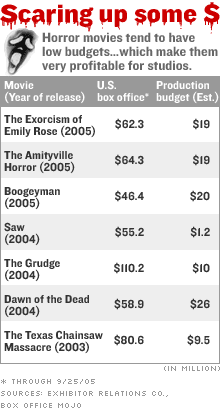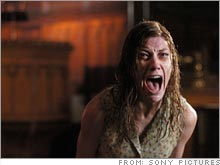 |
 |
| Why the long face? Sony movie executives are probably smiling about the success of surprise hit "The Exorcism of Emily Rose." |
|
|
|
|
|
|
|
|
|
NEW YORK (CNN/Money) � Do you like scary movies?
Apparently, the answer is yes. With all the talk of a box-office slump afflicting Hollywood this year, the lowly horror flick, which often lacks big special effects, bankable stars and favorable reviews from critics, has been a bright spot for the industry.
"The Exorcism of Emily Rose," which debuted three weeks ago, has been a surprise hit for Sony (Research), generating nearly $63 million in ticket sales.
Earlier this year, a remake of "The Amityville Horror" did about $64 million while "The Ring Two," a sequel to the 2002 blockbuster, brought in about $75 million.
"Horror is one of those genres that have a seemingly inexhaustible supply of audience," said Paul Dergarabedian, president of Exhibitor Relations Co, a box-office tracking firm. "And this year there has been a preponderance of ones that have done well."
With Halloween a month away, studios are hoping that the success will continue. Sony is releasing a remake of John Carpenter's 1980 horror classic "The Fog" on Oct. 14. General Electric's (Research) Universal has "Doom," a movie based on the popular video game about humans battling monsters, due out a week later.
Finally, Lions Gate Entertainment (Research) will be releasing "Saw II," the sequel to last year's thriller about a gruesome serial killer, on Oct. 28.
Nothing frightening about the profits
Why have horror films continued to find decent audiences at a time when many are shunning movie theaters?
Robert Routh, a media analyst with Jefferies & Co., said that the subject of horror films lend themselves to more creative advertising campaigns. In addition, there's often a greater onus on making sure the story is interesting since horror movies usually don't rely on well-known movie starts.
"The key is quality. Who plays what part is not as big of a driver that leads people to the box office as it is in an action/adventure film," said Routh.
With this in mind, horror movies are also a boon for many studios. Since production costs are relatively low, it's a lot easier to make a healthy profit on a horror movie.
"Horror always has a consistent audience. That doesn't often translate into blockbuster numbers but since they tend to be cheaper anyway, they don't need to do over $100 million," said Brandon Gray, president and publisher of Box Office Mojo, a movie research company.
Take last year's "Saw." It was the first movie for its writer and director and its main star was Cary Elwes, a relatively well-regarded actor, but not someone in the league of Tom Cruise or Brad Pitt. "Saw" only cost an estimated $1.2 million to make but generated more than $55 million in box office receipts in the United States, according to Box Office Mojo.
Lions Gate is obviously hoping to strike gold with the sequel and the small studio has a history of taking chances on horror movies.
The studio released "The Devil's Rejects" this summer, a movie made by musician Rob Zombie. Although that generated just $17 million at the box office, it only cost an estimated $7 million to make. Lions Gate also had a hit with last year's minimalist shark attack movie "Open Water," which featured two unknown actors and cost just $500,000. It did about $30 million at the U.S. box office.
"Lions Gate has generally been successful with horror and it's not surprising. Horror is the sort of thing that smaller independents have historically done well," said Dennis McAlpine, an independent media analyst.
He pointed to how New Line Cinema, which is now a part of Time Warner (Research), made a name for itself in the 1980s with its popular " A Nightmare on Elm Street" series. (Time Warner also owns CNN/Money.)
But Dergarabedian said that horror success isn't limited to independents. He said Sony has done a solid job of producing and marketing hits through its Screen Gems label. In addition to "The Exorcism of Emily Rose," it also had moderate hits with "Boogeyman" and last year's "Resident Evil: Apocalypse" and "Anacondas: Hunt for the Blood Orchid."
A scary movie bubble?
So how come other studios aren't making more frightfests?
Gray thinks that at the end of the day, Hollywood is most interested in huge multi-million blockbusters. And it's rare for a horror movie to do more than $100 million.
"Big studios set their sights at higher levels so they don't rely on horror as much. Even though they may have a great return on investment, the numbers are still low on an absolute basis," he said.
Dergarabedian adds that Hollywood is afraid (pardon the pun) of tiring audiences out. He noted that there have been more than 35 horror films released in the past two years.
"That's a pretty good number. You do have to be careful about oversaturating the market," he said.
But Routh thinks many studios haven't done nearly as good a job of tapping the demand for scary movies as they could.
"We're nowhere near the saturation point. The key is quality. As long as the movies are good people will go see them and buy the DVDs," said Routh. "This really is a growing niche area with a cult following."
For a look at media and entertainment stocks, click here.
What's the main reason for the box office slump? Click here.
Jefferies' Routh owns shares of Lions Gate and his firm has an investment banking relationship with the company. Other analysts do not own shares of companies mentioned and their firms do not have banking ties to the companies.
The reporter of this story owns shares of Time Warner through his company's 401(k) plan.

|